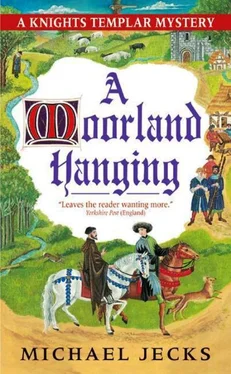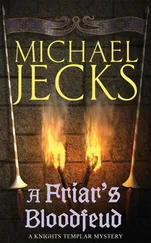“No, bailiff.”
Simon glanced at the miner. “The two riders were men-at-arms from the Manor. It was they who found Bruther’s body shortly after.”
“Are they here?” Thomas asked, surveying the men ranged opposite.
“They are dead,” said Baldwin shortly, and a dangerous new wave of tension gripped the watching men.
“How? How did they die?”
It was Sir William who answered, sounding as tired as the miner. “They appear to have got into a fight over a game of dice. Both were stabbed.”
“When was this?” the miner demanded.
Simon told him. “Early this morning. When we found them, their bodies were still warm.”
Thomas Smyth turned to peer at John. “It was you, wasn’t it?” His voice shook with emotion. “The men could identify you somehow, and you killed them to conceal your guilt.”
“Be silent, Thomas!” Simon said, but John had gone white with fury.
Leaping out of his chair, he faced the miner, grabbing his sword’s hilt. But before he could draw it, Edgar slapped his hand away. There was an angry rumble from the Beauscyr men, met by a sudden movement from the miners at the other end of the space where the tinners sat and listened. Simon quickly stood, hands held high. “Be still!” he bellowed, and then looked from Thomas to Sir William. Both also stood, slowly and unwillingly, and calmed their men. Meanwhile, John stood glowering furiously at Edgar, who smiled back calmly, his eyes never moving from the boy.
Simon glared at the youngest Beauscyr. “Keep your hand from your sword, squire. I’ll have no more blood on the moors today.”
“You expect me, me, the son of an honorable knight to accept being accused of common murder? By a miner? By God, you have no right to…”
“Silence! I have every right, and every duty, to investigate a murder. Stand before us, and keep your hand from your sword. Do I have to remind you that this is a lawful investigation into murder? If you don’t obey I’ll have you arrested and kept at Lydford prison.”
For a moment, Baldwin thought John was going to argue. He glared fiercely at the bailiff, while he considered his position. Simon was red-faced with fury, his anger simmering, ready to boil up and scald the lad. At last, giving a scornful shrug, the boy strode off to stand beside his brother.
“John Beauscyr, you were out on the moors that day. Did you see anyone else? Someone who could have been involved in the murder of Peter Bruther?” His rage ebbing, Simon realized he must leave out the boy’s admission of robbery. In the present climate it would be too much to expect the miners to control their ire if they were to discover that John had been involved, on his own admission, in banditry. John spoke shortly about that evening, about the ride to Thomas Smyth’s house and the subsequent journey to the inn. When he talked of the meeting with Bruther on the road, a hush fell, and everyone seemed to be listening intently.
Baldwin thought he made a good witness, strong, upright, and speaking with a controlled certainty. His very stance implied conviction, his legs a short distance apart, his arms crossed over his chest. He was the image of all knightly virtues.
Simon carefully took him through the meeting with Bruther, how he and his men had left the young Beauscyr and his knight, jeering at them as they rode on to the inn. “And you saw no one else on the road after you left Bruther?”
“No, nobody.” Again his flat statement carried no room for any doubt.
“So, then, it comes to this,” said Simon, speaking loudly now for the benefit of the miners and Beauscyr men ranged all round. “Bruther went home from the inn. At his father’s house his men left him and he carried on alone over the moors. Some time later, Adam Coyt came along the road on his way home, and he heard a rider to the north of him on the moors. He didn’t look to see who it was.” There was a slight lightening of tension in the crowds, even a nervous ripple of laughter as he added dryly, “He thought it might be the Devil or Crockern at that time of night. Now, listen to me, all of you!” He stood and surveyed the watching crowd. “It’s certain that Thomas didn’t order his own son to be murdered. John Beauscyr was with his friend at the inn. His brother was with Alicia Smyth. None of these caused the killing. I don’t yet know who was responsible for Peter Bruther’s killing. But I will find out, and when I do, the man will be arrested and held for trial.”
There was a shout from the crowd behind him, a voice sneering, “You’re playing at this. Why should you care about a miner? You don’t care about Bruther. All you want is to help your friends the Beauscyrs.”
“Do you think I’m paid by the Beauscyrs?” Simon roared, his face flushing a dark red. “Do you think I’m held by Sir William’s purse? You might just as well suggest I’m paid by the miners. It was me stopped Sir William from riding out to bring Bruther back, it was me told his sons to leave the miners in peace, it was me who tried to stop this madness. I’ll not have it said I’m a hireling who’ll dishonor my position for bribes.” His furious gaze swept round the men in the crowd, and Baldwin saw with a small grin, quickly covered, that those who caught his eye immediately looked away. No one was keen to risk the bailiff’s wrath.
Simon calmed himself with an obvious effort. “This affair is sad and unpleasant, but fighting between the miners and the Beauscyr men must stop. There is no point in further loss of life. I don’t want to hear of any more killings. I’ll find the killer of Bruther, just as I’ll find the murderer of Samuel Hankyn and Ronald Taverner. Three men have died, and God only knows how many have been killed – and how many more will die – because of the fight here today. It must stop.” He looked at Sir William and Smyth. “Both of you must settle your differences. I can’t stop you trying to kill each other if that’s what you’re determined to do, but, by God, if I hear that there’s another battle here I’ll get the King to send troops and impose his peace on the moors! Now I’m going, and Sir William, I want you to take your men back to the Manor. I’ll see you there later. Thomas, I expect you to release Sir Robert immediately.”
Baldwin watched, still seated, as the miner and landlord agreed, and their men began to gather up their weapons. Gradually, the Beauscyr men set off away from the meeting place and up the hill, some collecting horses from those holding them, and mounting. The miners were sullen, staring and muttering among themselves as their enemies slowly departed, a few tending to the wounds of bleeding friends.
He sighed. There were so many murders nowadays that all too often the killer would escape. A merchant could be stabbed on the roads and the local people might never have seen his attacker, or even if they had, they might not know his name. Sometimes if a man was known and he was caught red-handed, he could avoid justice by running away. After all, if he was never captured he could not be made to pay. It would be down to the local people to pay taxes to the Crown for the breaking of the King’s peace.
The area was clearing quickly now, men on all sides gathering into small clumps and moving apart, the tinners starting to walk to their huts, the soldiers riding or slouching off. Baldwin watched Simon talking to Robert. The young man was pale and drawn, but Baldwin put that down to fear of his potential father-in-law. That he did not seem to have suffered at the hands of the miners was a relief.
John mounted his horse, snapped his reins and cantered away, and Baldwin’s eyes followed him until he was a small figure on the horizon. The boy was irritating, certainly, but that did not mean he was a murderer. Even so, he had been out that night, and though there was a witness of sorts in the person of the robbed man toward Chagford, it was possible that John could have killed Bruther earlier, then hurried east to create an alibi. Baldwin did not share Simon’s conviction of John’s innocence.
Читать дальше












